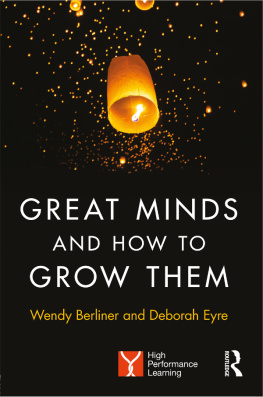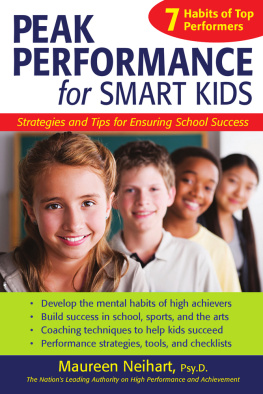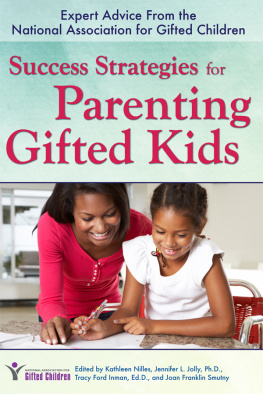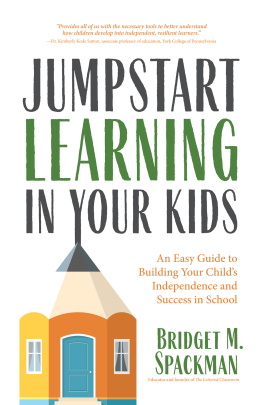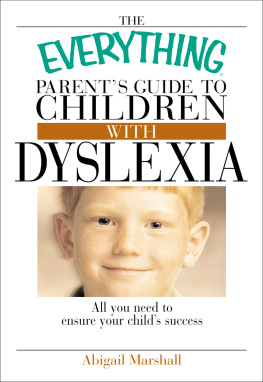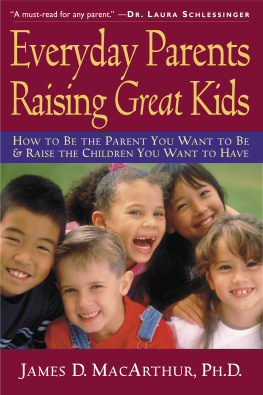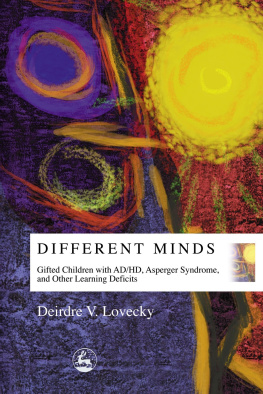
p.i
Great Minds and How to Grow Them
Great Minds and How to Grow Them is a handbook for parents that shows how they can grow the minds of their children and teenagers and guide them to success both at school and in life. The latest neurological and psychological research is proving that most children are capable of reaching high levels of performance that were previously associated only with the gifted and talented.
Brains are malleable and IQ is not fixed yet; without parental engagement in their learning, many children dont reach the levels of performance that are associated with academic success. Combining new knowledge with extensive research into how we learn, this book proves that by using simple, everyday techniques that are both rooted in research and accessible for parents, children can learn to learn more successfully.
There is room at the top of the class for many more children than we ever thought possible.
An engaging collaboration between a world-class academic and an award-winning journalist, this inspirational book includes chapters on:
how to develop a good home learning environment;
how to make the most of school;
how to develop values, attitudes and attributes that are associated with success at school and in life;
how to develop thinking and learning skills in the three ages of learning;
how to tackle potentially tricky areas like homework and adolescence.
This practical guide will be essential reading for parents, teachers and all those interested in helping children and young people to reach their full potential.
Wendy Berliner is Joint Chief Executive of the Educational Media Centre. An award-winning education journalist, she has spent her career at the Guardian , the Independent and has edited the Times Educational Supplement . She cares passionately about the role of parents in developing the learning of their children.
Deborah Eyre is the Founder and CEO of High Performance Learning, a global social enterprise helping good schools become great. A former Global Education Director at Nord Anglia Education, senior academic, educational writer and influencer, she specialises in how the most able people think and learn.
p.iii
Great Minds and How to
Grow Them
High Performance Learning
Wendy Berliner and Deborah Eyre

p.iv
First published 2018
by Routledge
2 Park Square, Milton Park, Abingdon, Oxon OX14 4RN
and by Routledge
711 Third Avenue, New York, NY 10017
Routledge is an imprint of the Taylor & Francis Group, an informa business
2018 Wendy Berliner and Deborah Eyre
The right of Wendy Berliner and Deborah Eyre to be identified as authors of this work has been asserted by them in accordance with sections 77 and 78 of the Copyright, Designs and Patents Act 1988.
All rights reserved. No part of this book may be reprinted or reproduced or utilised in any form or by any electronic, mechanical, or other means, now known or hereafter invented, including photocopying and recording, or in any information storage or retrieval system, without permission in writing from the publishers.
Trademark notice : Product or corporate names may be trademarks or registered trademarks, and are used only for identification and explanation without intent to infringe.
British Library Cataloguing in Publication Data
A catalogue record for this book is available from the British Library
Library of Congress Cataloging in Publication Data
A catalog record for this title has been requested
ISBN: 978-1-138-28459-3 (hbk)
ISBN: 978-1-138-28460-9 (pbk)
ISBN: 978-1-315-26938-2 (ebk)
Typeset in Palatino
by Swales & Willis Ltd, Exeter, Devon, UK
p.v
This book is for our children who educated us more than we educated them.
p.viii
We come from different working backgrounds. One in academia and one in journalism, we have known one another for more than 30 years yet have never collaborated professionally in this way before. But as the years have passed we have each separately and jointly become sure that parents can and do make all the difference to their childrens success in education, regardless of how good their school is; and the research proves it.
Indeed without parents willing and able to make learning opportunities and optimise them, the majority of children wont reach the levels of performance currently associated with the best in class. But we believe most could get there and, again, the research evidence of decades supports that. More recently the work of Deborah and other researchers has given us a much clearer view on how best to support your childs learning in a way that is more likely to lead to high academic performance.
Thats why weve written this book so that more children can make the most of themselves because their parents understand the irreplaceable role they have to play in their childrens educational success, regardless of how well or not they did in the education system, regardless of whether they have lots of money or very little and regardless of whether they have time... this isnt about time, its about a way of being with our children.
This is a book grounded in research about learning, particularly the learning of the most successful the ones who seem to cruise effortlessly to the top of the class. It is taking lessons from how they do that and applying it to all.
Learning for the most able has been Deborahs specialism. Her work is used by governments and schools across the world. As a former teacher she has dedicated her academic life to understanding how children think and learn and developing ways to help them learn better. But from her earliest days as a very young primary school teacher, when first given responsibility for bright children by an inspired head teacher, she had the hypothesis that all children could benefit from advanced ways of working and thinking if they were exposed to them. The research case that supports that from academics globally has simply become more and more compelling as the years have gone by and we now know why this is the case.
p.ix
Deborah always found the hard bit was choosing who the brightest ones were. Formal education doesnt have a great record in that regard. No Nobel Prize winner so far was identified as a prodigy while a child and Einstein, who was slow to talk, was seen as a slow learner described by the family maid as the dopey one.
Wendy, as a journalist specialising in education, in part because of her own beginnings, has taken particular interest in why some children do well at school despite disadvantaged backgrounds that see peers from the same streets achieve so much less. She too found parents or their equivalents who saw education as potentially life changing repeatedly in the background of the more successful children.
And thats important you dont have to be a parent to make this happen. You could be a carer or an auntie or uncle, whether familial or not, anyone acting in loco parentis in place of a parent.
So our work and our personal lives have led us both to become more and more certain you can create and expect success from pretty much everyone, regardless of background, in education because there is an increasingly better understanding of how success happens and how that happens is independent of where we start from.
Both of us have families who valued education because they saw it as a way for their children to have a better start than they had; a better life than their own. We think its what most parents hope for their children.
Next page
